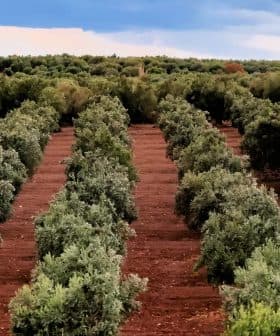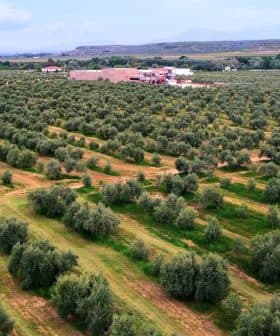Olive Oil Importers Lobby Congress to Oppose Marketing Order
A lobbying law firm representing major companies like Google and American Express has added the Alliance for Olive Oil Quality Standards as a client, which opposes stricter guidelines on imported olive oils proposed by California producers. The group has hired the firm for $80,000 in 2012 and is advocating against the move to add olive oil to the “Section 8e list” of commodities.

The law firm that lobbies congress for Google, American Express and Dow Chemical has added another client; a group called the Alliance for Olive Oil Quality Standards.
The new group is made up of olive oil importers who oppose a move by California olive oil producers to pass a federal marketing order and impose stricter guidelines on imported olive oils. The importers hope, as one put it, “to create a quiet groundswell against this effort by the domestic industry.”
Public records show the group has retained the international law firm, Aiken Gump, for $80,000 in 2012 — the same amount paid by multinationals Procter & Gamble and Siemen’s for the firm’s lobbying services this year.
The marketing order was first presented last January at a conference held in Dixon, California and later discussed at a California State Senate subcommittee informational hearing.
Marketing orders are enforced by the USDA at the request of domestic growers to establish quality standards and pool their resources. Domestic producers are pushing to have olive oil added to the “Section 8e list” of commodities which would force imported oils to meet the same criteria as those regulated by the marketing order.
Olive oil is a global trade and changes to any market’s grade standards affect producers in every region. But nowhere is there so much at stake for producers as in the U.S., which imports more olive oil than any other country in the world.
There would be far less debate over standards and quality if it weren’t for scrappy New World olive oil upstarts in Australia and the U.S. weary from competing with big European-subsidized producers who for years have shipped the bottom of the barrel to foreign markets so familiar with the taste of rancidity, they thought it was normal.
California producers provide less than 2 percent of the olive oil Americans consume, but they have ambitions to supply much more than that and differentiating their products in the market is the key.
In 2010, the California Olive Oil Council led a successful campaign seen as a vital first step that resulted in the USDA updating its 1948 standards for olive oil, effectively synching the unenforced U.S. guidelines with rules established by the International Olive Council.
Also in 2010, a widely-publicized study by the University of California at Davis found most imported olive oils to be substandard. That touched off something of a testing frenzy with reports coming in from all over the world that found consumers often didn’t get the olive oil quality they paid for.
The December, 2011 book by Tom Mueller; Extra Virginity, the Sublime and Scandalous World of Olive Oil, and the media tour that followed, cast more light on the olive oil quality issue. Mueller recently started Truth in Olive Oil which he described on his blog as “a citizen’s movement” for olive oil quality.
And Australian Olive Association President Paul Miller has been working on a World Olive Oil Quality Alliance anticipated to be a counterbalance to the International Olive Council. “If we can get it so what is genuine extra virgin, is traded as such and what isn’t, isn’t — it would just transform the industry,” he told Olive Oil Times last October when he began working on the project. Miller said an announcement on its status would be made before the end of this month.
Such developments have mobilized American importers alarmed by the thought of a new set of rules in the world’s largest market. Last month their trade group, the North American Olive Oil Association, petitioned the FDA to formally adopt the international standards with hopes of bringing the quality debate to a tidy end.
An importer who supports the new alliance called the marketing order a “problematic move” that would impose a “huge new administrative burden and require significant alterations to supply chains.”
During the Senate mark-up of the Farm Bill an amendment was offered to move olive oil to the 8e list and was rejected. However, the stalled House draft of the Farm Bill includes language that would add olive oil to the 8e list.
Congress faces reauthorization of the current five-year farm bill because many of its provisions expire in 2012.
The Senate approved its version on June 21, 2012; the House Agriculture Committee conducted markup of its version on July 11. Floor action on the House farm bill is pending.










